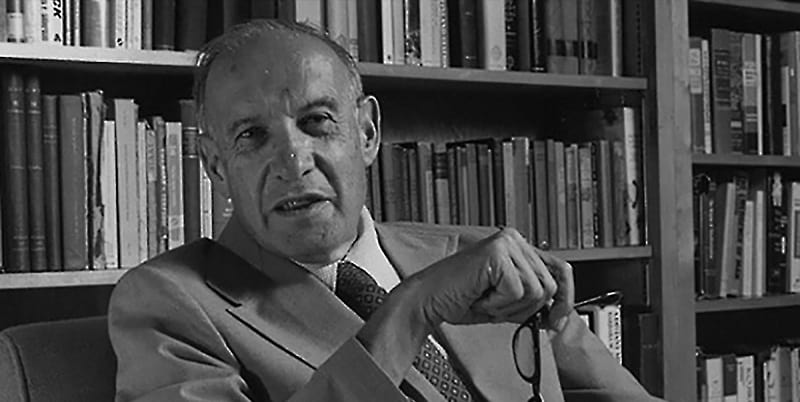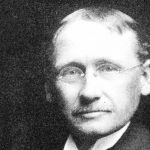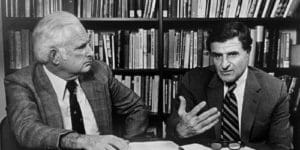Peter Drucker biography, quotes and books

Peter Drucker (November 19, 1909 – November 11, 2005) was a renowned American author and consultant in the field of organizational development and management. Peter Drucker also invented the concept of Management by Objectives (MBO). Drucker interpreted modern business management as a liberal art because he has introduced Human Dimension and Values into Management. This article covers his biography, quotes and publications.
Who is Peter Drucker? Biography
Youth
Peter Drucker grew up in a liberal Protestant household in Austria-Hungary. Both parents were of Jewish descent. Mother Caroline Bondi had studied medicine and father Adolf Drucker was a lawyer and a respected civil servant. Drucker himself was born in Vienna. He grew up in an environment full of intellectuals and scientists.
Peter Drucker studied legal sciences at the universities of Hamburg and Frankfurt where he also obtained his doctorate.
After one of his articles had been burnt by the Nazis, Peter Drucker, who was of Jewish descent, moved to London. Here he married Doris Schmitz. In London, he worked for an insurance company. Later he worked as the chief economist at a private bank. Later he relocated to the United States where he worked as a correspondent for various British newspapers.
The United States
In the US he became a consultant for General Motors (GM), which formed the basis of his well-known book Concept of the Corporation (1993).
From 1950 to 1971, Peter Drucker was Professor of Management at the New York University Graduate Business School. At the same time he accepted an ancillary position as a professor at Harvard Business School.
Then, he joined Claremont Graduate University in California, where they even named a faculty after him: the Peter F. Drucker Graduate School of Management.
Peter Drucker was a columnist for The Wall Street Journal from 1975 to 1995, and he published in well-known periodicals such as The Harvard Business Review. Drucker wrote 27 books on economics, sociology, politics and management and he wrote two novels.
He furthermore wrote his autobiography and he co-wrote a book on Japanese painting. Peter Drucker received many awards and prizes including the Presidential Medal of Freedom in 2002.
Peter Drucker theory
Peter Drucker has been invaluable in developing modern management theories. He revolutionized the approach to business management, suggesting that successful leaders should primarily focus on people and ethics, rather than profits and rigid rules and work structures.
The principles on which he based his theory are:
- Decentralization
- Prioritization of knowledge
- Management by objectives
- SMART goals
His people-centered theory, inspired by his experiences as a consultant at IBM, General Motors and Proctor & Gamble, led him to write the Practice of Management, a holistic approach to management. In this theory, he encouraged creative management, rather than bureaucratic management. Managers should be leaders, not agents.
Corporate Social Responsibility (CSR)
The term corporate social responsibility is widely known today. It was Drucker who took the lead in this. CSR is a form of self-regulation among organizations to be socially responsible and contribute to the well-being of the community.
Death
Peter Drucker died on November 11 in 2005, in Claremont, California. He died of natural causes at the age of 95 years old. Together with his wife Doris, he had four children. Doris died in October 2014 at the age of 103 years old.
Contributions to management
During his life, Peter Drucker became a well respected intellectual. He worked on many key ideas, including:
- Organisational decentralization and simplification
- Prediction of the cecline and marginalization of the blue collar worker
- The concept of oursourcing
- The importance of a well functioning non-profit sector
- The lament that the sole focus of microeconomics is price
- Respect for the worker
- The theory of public management
- The belief that taking action without thinking is the cause of every failure
- The need for a community
- The need to manage business by balancing needs and goals
- The belief that great companies could stand among mankind’s noblest interventions
- The company’s responsiblity to serve its customers
The Peter F. Drucker Foundation for Nonprofit Management, a management consultant firm, provides educational opportunities and resources to help nonprofits become more efficient and improve their skills.
Famous Quotes
- “Management is doing things right; leadership is doing the right things.”
- “The most important thing in communication is hearing what isn’t said.”
- “Today knowledge has power. It controls access to opportunity and advancement.”
- “Follow effective action with quiet reflection. From the quiet reflection will come even more effective action.”
- “Effective leadership is not about making speeches or being liked; leadership is defined by results not attributes.”
- “Plans are only good intentions unless they immediately degenerate into hard work.”
- “The productivity of work is not the responsibility of the worker but of the manager.”
- “Making good decisions is a crucial skill at every level.”
- “The purpose of a business is to create a customer.”
- “Knowledge has to be improved, challenged, and increased constantly, or it vanishes.”
- “The entrepreneur always searches for change, responds to it, and exploits it as an opportunity.”
- “The only thing we know about the future is that it will be different.”
- “Time is the scarcest resource and unless it is managed nothing else can be managed.”
- “A manager is responsible for the application and performance of knowledge.”
- “Management by objective works – if you know the objectives. Ninety percent of the time you don’t.”
- “Most of what we call management consists of making it difficult for people to get their work done.”
- “Efficiency is doing things right; effectiveness is doing the right things.”
- “The best way to predict your future is to create it.”
- “If you want something new, you have to stop doing something old.”
- “Unless commitment is made, there are only promises and hopes; but no plans.”
- “No one learns as much about a subject as one who is forced to teach it.”
Books and Publications by Peter Drucker
- 2014, 2006. Innovation and Entrepreneurship. HarperBusiness.
- 2011, 2007. Management challenges for the 21st century. Routledge.
- 2010, 2007, 1954. The Practice of Management. HarperBusiness.
- 2009, 2004. The Daily Drucker. HarperBusiness.
- 2008. Managing Oneself (Harvard Business Review Classics). Harvard Business Press.
- 2008. The Essential Drucker: The Best of Sixty Years of Peter Drucker’s Essential Writings on Management. Collins Business Essentials. HarperBusiness.
- 2008. The Five Most Important Questions You Will Ever Ask About Your Organization. Jossey-Bass.
- 2006, 1967. The Effective Executive: The Definitive Guide to Getting the Right Things Done. HarperBusiness.
- 2006, 2001. Managing the non-profit organization. HarperBusiness.
- 2004. What makes an effective executive. Harvard Business Review, 58-63.
- 2003. Managing in the Next Society. Routledge.
- 2002. The discipline of innovation. Harvard business review, 80, 95-104.
- 2001. The essential drucker (Vol. 81). Butterworth-Heinemann.
- 2001. Knowledge work and knowledge society: the social transformations of this century. British Library.
- 2000. Managing knowledge means managing oneself. Leader to leader, 16(2), 8-10.
- 1999. Knowledge-worker productivity: The biggest challenge. The knowledge management yearbook 2000-2001.
- 1999. Beyond the information revolution. ATLANTIC-BOSTON-, 284, 47-59.
- 1998. Peter Drucker on the profession of management. Harvard Business Press.
- 1998. The discipline of innovation. Harvard business review, 76(6), 149-157.
- 1998. Management’s new paradigms. Forbes Magazine, 10, 98.
- 1998. Harvard business review on knowledge management. Harvard Business Press.
- 1997. Global Economy and the Nation-State, The. Foreign Aff., 76, 159.
- 1996. Looking ahead: implications of the present. Harvard Business Review, 75(5), 18-32.
- 1995. People and performance: The best of Peter Drucker on management. Routledge.
- 1995. The age of social transformation.
- 1995. The future of industrial man (Vol. 1). Transaction Publishers.
- 1994. The theory of the business. Harvard business review, 72(5), 95-104.
- 1993. Post-Capitalist Society. Routledge.
- 1993. Managing in turbulent times. Routledge.
- 1993. Concept of the Corporation. Transaction Publishers.
- 1993. The New Society: The Anatomy of Industrial Society. Transaction publishers.
- 1989. What business can learn from non profits. Harvard business review, 67(4), 88-93.
- 1988. The coming of the new organization.
- 1988. Management and the worlds work. Harvard Business Review, 66(5), 65-76.
- 1986. The changed world economy. Foreign affairs, 768-791.
- 1984. The discipline of innovation. Harvard business review, 63(3), 67-72.
- 1984. The New Meaning of Corporate Social-Responsibility. California Management Review, 26(2), 53-63.
- 1984. Our entrepreneurial economy. Harvard Business Review, 62(1), 58-64.
- 1981. What is business ethics. Public interest, (63), 18-36.
- 1981. Behind Japans Success. Harvard Business Review, 59(1), 83-90.
- 1976. The unseen revolution: How pension fund socialism came to America. London: Heinemann.
- 1971. What we can learn from Japanese management. Harvard University. Graduate school of business administration.
- 1964. Managing for results: economic tasks and risk-taking decisions. Routledge.
- 1963. Managing for business effectiveness. Harvard Business Review.
- 1962. The economy’s dark continent. Fortune, 65(103,265,266,268), 270.
- 1959. Long-range planning-challenge to management science. Management Science, 5(3), 238-249.
How to cite this article:
Van Vliet, V. (2010). Peter Drucker. Retrieved [insert date] from Toolshero: https://www.toolshero.com/toolsheroes/peter-drucker/
Original publication date: 10/01/2014 | Last update: 01/09/2024
Add a link to this page on your website:
<a href=”https://www.toolshero.com/toolsheroes/peter-drucker/”>Toolshero: Peter Drucker</a>












3 responses to “Peter Drucker biography, quotes and books”
Can Add a link to your website in my website?
Sure, no problem
Hello Raghavan,
Yes you can 🙂 At the bottom of the article you’ll see a APA style or Refer suggestion
If you have any other questions, please let us know